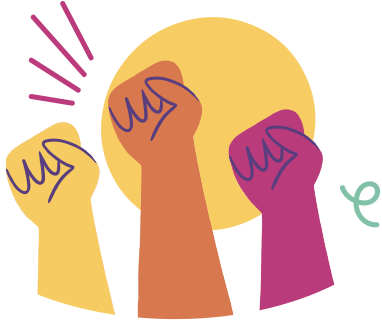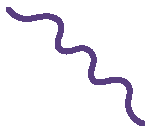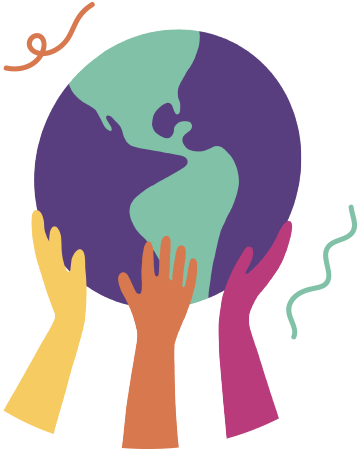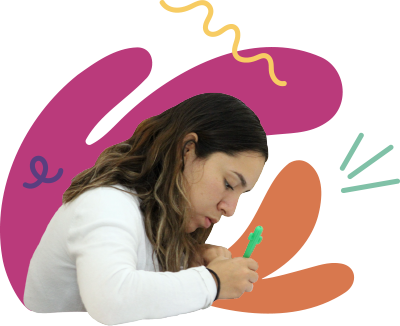We train leaders and accompany movements
Training for action
➔ Spaces for learning and reflection are fundamental for women and youth from different fields to strengthen their perspectives and praxis. Through the Modelos para Desarmar (Models for Disarming) Certificate, we generate a permanent program on theory, feminisms, gender, and racialization to understand, problematize and offer tools of analysis on current debates of feminisms such as anti-punitive justice, transfeminisms, or disability studies, as well as to generate dialogues and exchange of knowledge between activists, people from civil society and academia at the national level.
➔ We believe in the importance of linking theory and practice for social change, translating feminist theories and articulating them to our daily reality, both as individuals and collectively. Through the Instituto Latinoamericano de Sexualidad y Política (Latin American Institute of Sexuality and Politics), we gathered more than 25 activists from Latin America, members of various women's rights movements, and gender-diverse people to provide spaces for reflection and exchange of strategies and practices on gender, sexuality, politics, and human rights that strengthen their activism and build bridges between the movements of the global south.
➔ Comprehensive Sexuality Education (CSE) allows girls, boys, adolescents, and young people to access scientific, secular and appropriate information for each stage of life, understand sexuality in all its dimensions, and develop skills and attitudes favorable to their health and well-being. In Mexico and the region, the effective implementation of CSE is still an unresolved issue; therefore, at ILSB, we contribute to generating a broader critical mass that demands it through the articulation and dialogue between activists, professionals, academics, and experts on the subject from Mexico, Argentina, Colombia, and Guatemala, as well as the training and generation of inputs for middle and high school teachers, to provide them with the necessary tools to strengthen their capacities on the subject.
➔ In Latin America, domestic workers have struggled for more than 30 years to advance the recognition of their labor rights. Although there have been significant advances, there is still much to be done in a context where the pandemic, economic precariousness, confinement, and excessive care burdens, join the difficulties faced by the sector to articulate and carry out activist actions. Therefore, from ILSB, we continue working through the training, internal strengthening of organizations and collectives, and the generation of regional meetings and spaces for articulating to contribute to the consolidation, cohesion, and decentralization of the organized movement of domestic workers.



Healing, caring, and resisting
➔ In recent years, violence against land and territorial defenders has increased in the region, and territorial defense movements, in general terms, have not been able to achieve equal participation of women and youth. In this context, we articulated a strategy to strengthen their role, recognize their contributions and socialize protection and resistance practices. Within this framework, the Tejiendo Raíces de Sanación y Resistencia (Weaving Roots of Healing and Resistance) meetings allowed women defenders of collective and community organizations from Mexico, Guatemala, Honduras, Panama, Colombia, Peru, Bolivia, and Chile to strengthen, dialogue, and exchange practices of healing and collective care to confront megaprojects, extractive projects and problems derived from the pandemic. In addition, the publications "Rural women in Mexico. A look from a gender perspective" and "Caregivers of life and territory. Strategies of action and resistance in contexts of harassment and territorial dispossession" allowed us to make visible and report the violence faced by women in different communities, as well as to systematize a vast repertoire of strategies and practices in contexts of territorial defense. Finally, the Mujeres Mayas Tejiendo Colectividad en los Territorios (Mayan Women Weaving Collectivity in the Territories) process favored the articulation of 15 collectives and organizations of women defenders and caretakers of the territory in the Yucatan Peninsula to strengthen the exchange of knowledge and experiences, as well as to make visible and strengthen the proposals of Mayan women to move towards collective processes of action and social incidence in that region of the country.
➔ For more than 10 years, we have accompanied and strengthened the Indigenous and Afro-Mexican women's movement to transform the realities of racism and discrimination within and outside their communities. In 2021, the Indigenous women's networks Trenzando Saberes from Oaxaca, Peépeno'ob from Yucatán, and REMIAC from Chiapas told their own stories of struggle through 3 audiovisuals in the series Andares Colectivos: mujeres indígenas, caminos y aprendizajes (Collective Journeys: Indigenous Women, Paths and Learnings). In their stories, they share their efforts to demand sexual and reproductive rights and guarantee indigenous women's political participation at the municipal, state, and federal levels. From their own identity, they inspire other young women to join the networks and keep up the fight for women and Indigenous peoples.


Youth all over Mexico
➔ In Mexico, not all young people have access to youth-friendly sexual and reproductive health information and services, a reality that partially contributes to the high rates of unwanted adolescent pregnancies. In 2021, we promoted the leadership of 102 new members of our youth networks through the REDefine Leadership School, an innovative model that promotes youth leadership, transmits tools, and generates skills that help them implement successful advocacy processes in public policy as well as raise awareness for the promotion and defense of sexual and reproductive rights in Mexico.
➔ In 2021, 70 young women, men, and non-binary people joined the networks that we accompany in 12 states of the country to disseminate, promote and defend sexual and reproductive rights at the local level. They are a reference to represent young people's voices and needs and promote concrete advances through social and political advocacy. Through workshops, training, and public and private events, they impacted more than 15,000 people, generating a critical mass that catalyzes social transformations.
